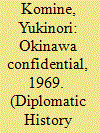| Srl | Item |
| 1 |
ID:
188582


|
|
|
|
|
| Summary/Abstract |
The treaty that the Ryukyu Kingdom signed with the US government in 1854 was crucial for understanding cooperation between the US and Japanese governments when the latter annexed the Ryuku Islands in 1879 (an episode known as the Ryukyu shobun). The article explores how Japan-US negotiations over treaty rights facilitated Japan’s ambitions in the Ryukyus, Ogasawara Islands, and Korea, as well as their confrontation when the US annexed the Kingdom of Hawai’i. By the early twentieth century, these two powers had mutually accepted each other’s territorial acquisitions and, in so doing, built their own empires and brought stability to East Asia and the Pacific. Reviewing the informal agreement between Japan and the US during the annexation of the Ryukyus, we can better appreciate how the first shobun set the stage for later events.
|
|
|
|
|
|
|
|
|
|
|
|
|
|
|
|
| 2 |
ID:
131452


|
|
|
|
|
| Publication |
2013.
|
| Summary/Abstract |
This article demonstrates that during the 1969 Okinawa reversion negotiations, there were both secret agreements and disagreements between the U.S. and Japan regarding the conditions applied to the use of United States bases on Okinawa after reversion. The United States sought to preserve the unrestricted use of its bases on Okinawa for conventional combat operations in regional contingencies including Korea, Taiwan, and Indochina, as well as the emergency re-entry and transit rights of nuclear weapons. Due to the antinuclear public sentiment and fear of the entrapment into regional conflicts, Japan pursued the withdrawal of all nuclear weapons from Okinawa. While the United States insisted on making confidential written arrangements for the nuclear and base issues, Japan attempted to focus on public statements to explain mutual agreements but provided verbal private assurances. In the end, the United States and Japan agreed to maintain U.S. base functions for the continued U.S. deterrent capabilities in East Asia.
|
|
|
|
|
|
|
|
|
|
|
|
|
|
|
|